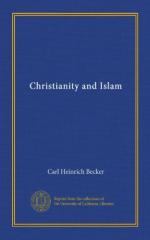Polytheism was incompatible with the idea of God as a judge supreme and righteous, but yet merciful. Thus monotheism was indissolubly connected with Muhammed’s first religious impulses, though the dogma had not assumed the polemical form in which it afterwards confronted the old Arabian and Christian beliefs. But a mind stirred by religious emotion only rose to the height of prophetic power after a long course of development which human knowledge can but dimly surmise. Christianity and Judaism had their sacred books which the founders of these religions had produced. In them were the words of God, transmitted through Moses to the Jews and through Jesus to the Christians. Jesus and Moses had been God’s ambassadors to their peoples. Who then could bring to the Arabs the glad tidings which should guide them to the happy fields of Paradise? Among primitive peoples God is regarded as very near to man. The Arabs had, their fortune-tellers and augurs who cast lots before God and explained His will in mysterious rhythmical utterances. Muhammed was at first more intimately connected with this class of Arab fortune-tellers than is usually supposed. The best proof of the fact is the vehemence with which he repudiates all comparison between these fortune-tellers and himself, even as early Christian apologetics and polemics attacked the rival cults of the later classical world, which possessed forms of ritual akin to those observed by Christianity. The existence of a fortune-telling class among the Arabs shows that Muhammed may well have been endowed with psychological tendencies which only awaited the vivifying influence of Judaism and Christianity to emerge as the prophetic impulse forcing him to stand forth in public and to stir the people from their indifference: “Be ye converted, for the day of judgment is at hand: God has declared it unto me, as he declared it unto Moses and Jesus. I am the apostle of God to you, Arabs. Salvation is yours only if ye submit to the will of God preached by me.” This act of submission Muhammed calls Islam. Thus at the hour of Islam’s birth, before its founder had proclaimed his ideas, the influence of Christianity is indisputable. It was this influence which made of the Arab seer and inspired prophet, the apostle of God.




